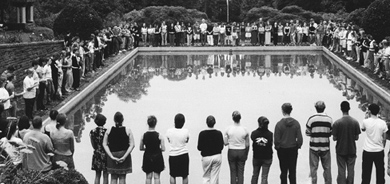Campus mourns unfathomable tragedy
“A tragedy of unspeakable proportions has befallen our nation, indeed our world, today,” President Michael Mooney said in a message to the Lewis & Clark community on Sept. 11.
“None of us will remain untouched by the horror of this tragedy, and, for many, there will be personal loss and bereavement that can never be erased.
“This is a time for caring, not judgment,” he said, “and I urge all of us to reach out to one another and affirm the best instincts of our common humanity.”
Members of the Lewis & Clark community knelt in prayer and silent meditation, lit candles by the reflecting pool, organized a blood drive and a benefit concert, and struggled to make sense of the unfathomable in classrooms and at an academic forum.
“I’ve never been so proud of my alma mater,” said Sylvia Sissel ’95, director of development research and records. “President Mooney gave us so many opportunities to express our grief and to reach out to one another. We’ve never been closer as a community.”
Instead of closing the College on Sept. 11, Mooney urged faculty to use class time to discuss the atrocities and convened an all-campus convocation.
“I always wondered what it would have felt like to hear that Pearl Harbor had just been bombed,” one student said at the convocation. “Now, I know.”
“There are things that happen in human life that escape our ability to speak about them,” Mooney said. “This will be the defining moment in your college career—the moment you will never forget.”
Curtis Johnson, dean of the College, reported the good news: He had heard from all 14 students enrolled in the College’s off-campus study program in New York City. Four had arrived in New York before the attacks, and the others were waiting for airports to reopen. All were safe.
Jon Eldridge, dean of students, encouraged students to make a free phone call to loved ones, to monitor the news on televisions set up in Templeton Student Center, to meet in Agnes Flanagan Chapel for daily meditation and prayer, to check the College’s emergency Web site for updates, to visit the Center for Service and Work for ways to volunteer, and to chat with the College’s chaplains and counselors.
“Care for each other. Look out for each other,” he said. “If you see someone moving from grief to despair, be there for that person.”
Kim Stafford read “A Ritual to Read to Each Other,” a poem by his father, the late William Stafford, professor emeritus of English.
Joann Geddes, director of the Institute for the Study of American Language and Culture, urged the campus to reach out to the College’s 163 international students. “They share America’s sadness and shock.”
“Resolve not to think in stereotypes,” Mooney cautioned. “Affirm the diverse community that we are.”
Greg Caldwell, associate dean of students and director of international student services, instructed international students on ways to avoid harassment when they are off campus. And U.S. Representative Earl Blumenaurer ’70, JD ’76 called international students to a special meeting to answer their questions. Even so, about a dozen students from the Middle East opted for a leave of absence this semester.
Athletics Director Steve Wallo canceled football and volleyball games and cross-country tournaments.
Violinist Aaron Meyer ’95 and pianist Michael Allen Harrison performed in a benefit concert.
Lewis & Clark is not only ethnically diverse, it is also politically diverse. While 200 faculty and students rallied for peace on Sept. 20, other students argued for military action.
Throughout the week, the Rev. Mark Duntley, dean of the chapel conducted interfaith services and organized community gatherings for contemplation and mutual support.

More than 200 students gathered at a candlelight vigil at the reflecting pool on Sept. 14. Sophomore Sarah Lundstedt organized the vigil.
More L&C Magazine Stories
Lewis & Clark Magazine is located in McAfee on the Undergraduate Campus.
MSC: 19
email magazine@lclark.edu
voice 503-768-7970
fax 503-768-7969
The L&C Magazine staff welcomes letters and emails from readers about topics covered in the magazine. Correspondence must include your name and location and may be edited.
Lewis & Clark Magazine
Lewis & Clark
615 S. Palatine Hill Road MSC 19
Portland OR 97219

